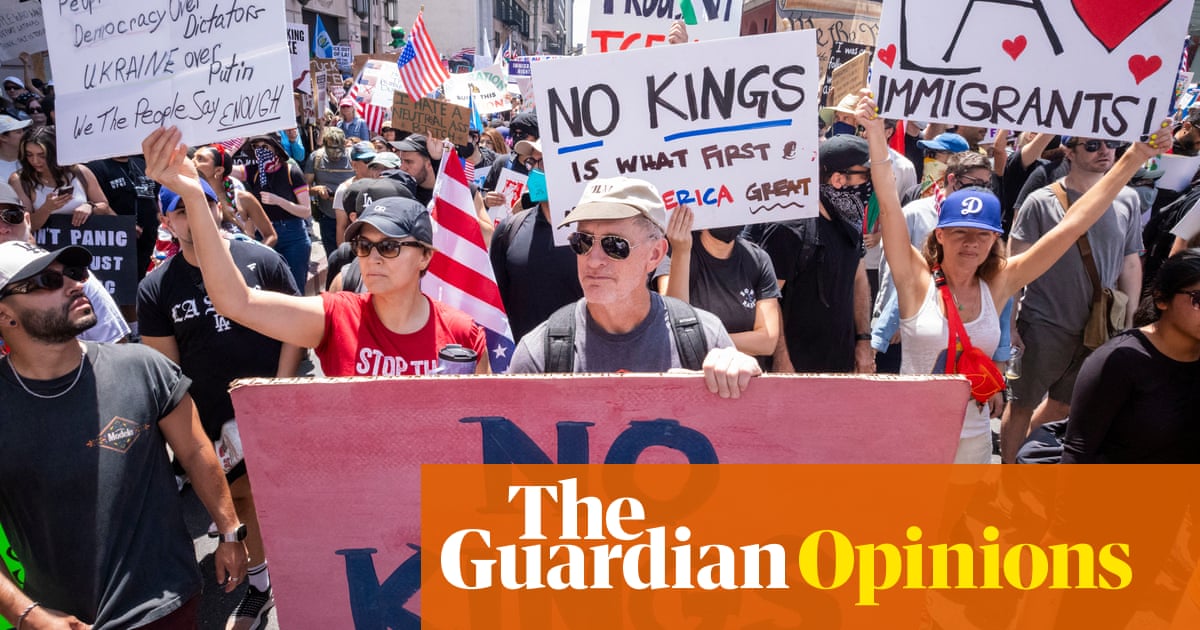Two months ago, around the US, mass demonstrations against Donald Trump were organised in what felt like the beginning of the great unfreezing of the popular movement. Since the inauguration in January there have been plenty of ad-hoc anti-Trump protests, but compared to the huge numbers that turned out in 2017 – half a millionat the Women’s Marchin Washington DC alone – the response has been muted. What was the point? The threat was so large, and the failure of the first movement apparently so great, that Americans have been suffering from what appeared to be a case of embarrassed paralysis: a sense, at once sheepish and depressed, that pink hats weren’t moving the needle on this one.
It looks as if that thinking has changed. On Saturday, in a follow-up to the protests in April, more than 2,000coordinated marches took placein the US, organised by multiple groups under the umbrella No Kings Day and attended by numbers that at a glance seem startling. While in the capital on Saturday, Trump oversaw his weird, sparsely attended Kim Jong-un stylemilitary parade, an estimated 5 million people country-wide took to the streets to protest peacefully against him, includingan estimated80,000 in Philadelphia,75,000 in Chicago,50,000 in New York,20,000 in Phoenix, and7,000 in Honolulu. More heartening still were the numbers from deep red states, such as the2,000 odd protesterswho gathered in Mobile, Alabama, and a reported4,000 in Louisville, Kentucky.
These protests were different in nature to their earlier incarnations, according to the accounts of some of those in attendance. I was in New York last month and friends who’d been at the march in April recounted, with amusement and despair, how few young people had shown up. In addition, said a friend, an elderly demonstrator marching close to them had shushed the crowd and put her fingers in her ears, and another set of women had started dancing, obliviously, to the music being played by pro-Trump counter-protesters on the sidelines. All successful protests require participants to forgive each other their differences, but we shook with laughter as he told us how hopeless and uninspiring – “it’s a protest sweetie, what did you expect?” – he’d found some of his fellow marchers.
It was a different story on Saturday. The crowds were bigger – by some estimates, thelargest country-wide demonstrationsever recorded – younger, more energised and more focused. There was, I gather, a sense of urgency unleashed by the feeling not only that these protests were long overdue but that, after Trump’s deployment of the national guard in LA, some critical line had been crossed. Meanwhile, as a unifying slogan, the No Kings thing really seems to be working. When I first heard the phrase I thought it was limp – my forelock-tugging Pavlovian response to the word “king” and any reference to monarchy, I guess.
I forgot: Americans presented with the same word go to George III not Charles III, and the signs on Saturday took up No Kings with real relish. This is a significant victory, given how hard it is to unite diverse constituencies under a single, snappy umbrella. There were a lot of very funny signs on the marches (some standouts: “Only he could ruin tacos”; “If Kamala were president we’d be at brunch” and my favourite, “Trump cheats at golf”.) But overarching them all was a slogan that in the most efficient way possible presented multiple groups with a non-partisan way to come out against Trump.
So far, No Kings has also avoided some of the mistakes of the Women’s March, in which the celebrity of the organisers came to overshadow and poison the movement. The No Kings motif was coined earlier this year by the progressive group 50501 – the name is a reference to 50 protests, 50 states, one movement – and was created before the 17 February demonstrations as an alternative to the hashtag #NotMyPresidentsDay, which it was felt, shrewdly, struck the wrong tone. Instead, the group launched the phrase “No Kings on Presidents Day,” which by this month had compacted down into No Kings Day. As yet, 50501, which grew out of a Reddit post, has no identifiable leaders.
This makes it a much harder target for Trump’s “black propagandists” to divide protesters via their political differences. Instead, No Kings seems to be offering a very broad on-ramp to protesters by way of a story that is simple and true: that opposition to Trump’s autocratic style is an act of patriotism with its roots in the country’s very foundations.
Emma Brockes is a Guardian columnist
